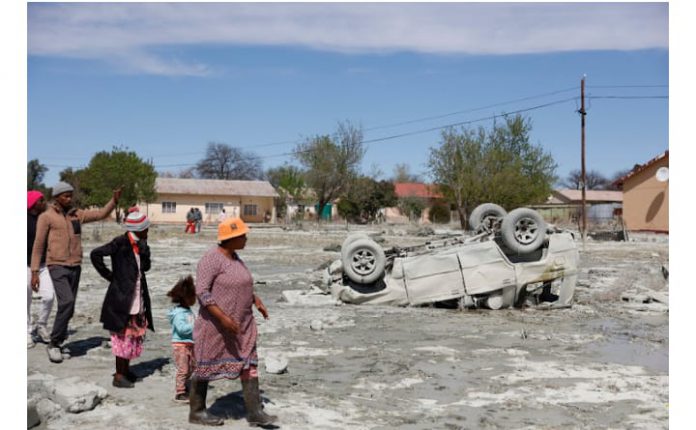Exactly a year after the Jagersfontein mudslide disaster, little has changed for the southern Free State community which says it has been forgotten.
Monday marked one year since the disaster which claimed the lives of two people, leaving 40 others injured after a tailings dam wall at the Jagersfontein diamond mine broke, flooding the townships of Charlesville and Itumeleng.
To mark the anniversary, the Bench Marks Foundation released a damning report which found that none of the victims have had their dignity restored. It said people are still living in rental accommodation, backrooms or with extended families.
The report also found that there is no official investigation into the disaster.
The report further suggested that the departments of water, minerals and energy, health and safety and environment failed to regulate the mine in regards to the tailings and should take some responsibility.
In May, Free State premier Mxolisi Dukwana, who visited the area with deputy president Paul Mashatile, promised residents that homes would be rebuilt and jobs would be created.
Lead researcher David van Wyk said there is a loss of trust in a stable environment as well as loss of security.
“The community was promised that there would be an investigation into the disaster, we have yet to see an official investigation. We hear of court cases against the company but the details are not shared with the community. The community is left in the dark,” Van Wyk said.
Resident Kgathatso Moshe said that the lack of progress doesn’t sit well with him.
“I am not happy about what’s happening. It really isn’t a nice feeling at all, especially when you look around and there have been no changes. The government isn’t trustworthy and they are unreliable because there are people who are still suffering. We haven’t really had any progress, especially with the cases that have been opened,” he said.
Boitumelo Scholtz said promises made by the government were not kept.
“The government just comes and goes, does little and then disappears to only appear after many months and with nothing to show for it. Only five houses have started being built and out of those five houses only three are ready but no one has been living in those houses and we are here [where the report was being released in the area] to hear feedback on what’s going on because no one is telling us anything,” Scholtz said.
Papi Mohajane, 52, who lost his house said: “It’s still painful even now even though it happened last year, it’s still fresh to a lot of us and I would be angry if there wasn’t anything happening but the progress although little and slow is still a relief.”
The family of 78-year-old Aaron Mosoeu who was swept away by the mudslide commemorated the disaster by visiting his grave.
His sister Dimakatso Mosoeu said: “It has been very painful and hard but we have managed to get by. We live in Bloemfontein [about 130km to the north] and travelled to Jagersfontein to spend the day at his grave.”
The foundation further highlighted that the disaster has caused environmental issues in the already economically depressed area.
“Professors from the University of Free State have said that the sludge itself is not dangerous but we are worried because the dust from dried up sludge. The dust fills up the air in the area during ongoing clean-up operation and when big trucks drive up and down.
“We looked at other academic studies which were done long before the disaster of those tailings and of that environment, and it was found that the tailings waste in that area contains high levels of arsenic (a poisonous chemical element) and the arsenic has also infiltrated the natural water around the mine. Members of the community are complaining about coughing, itchy skin, nose bleeds and headaches as the clean up operations are continuing,” Van Wyk said.
The report said that tailings should be monitored and should not be close to public institutions.
In September 2022, Sowetan established that before the incident, Jagersfontein Developments, which operates the mine, had received a warning about the rise in water levels at its tailings dam.











